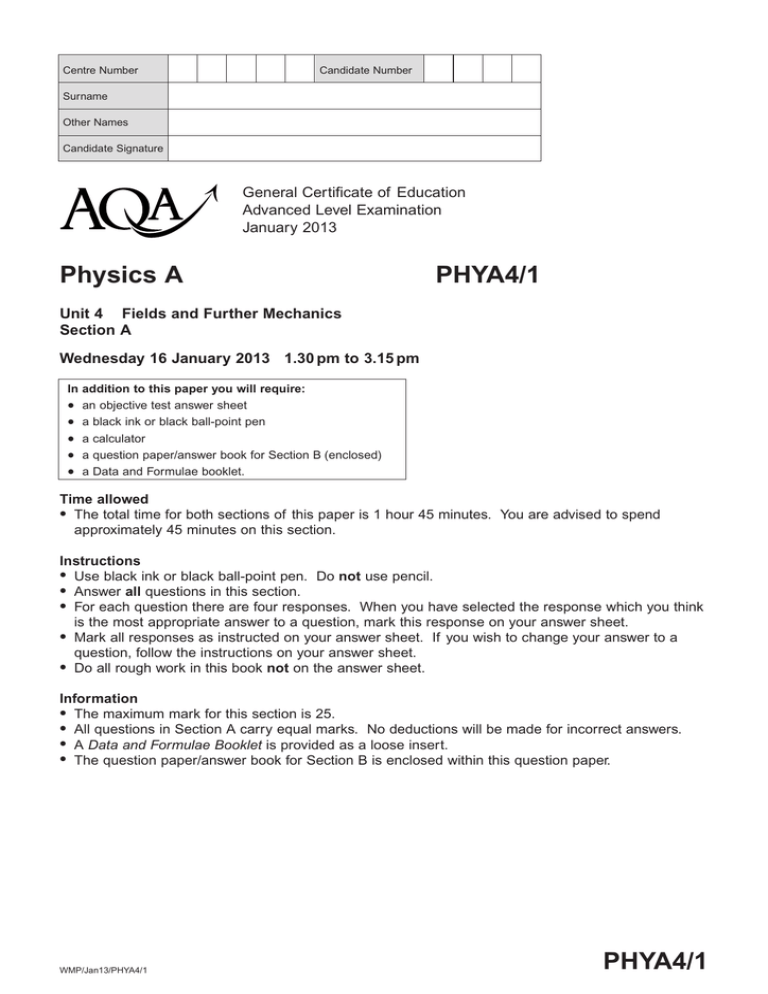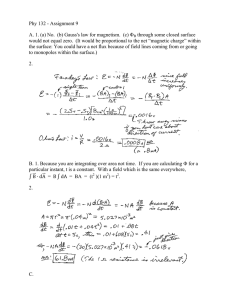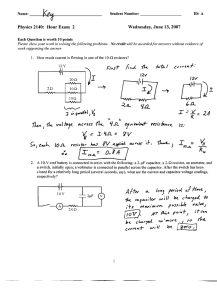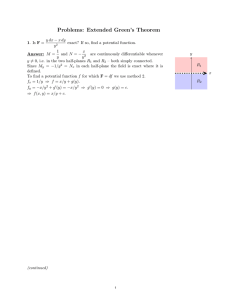
Centre Number
Candidate Number
Surname
Other Names
Candidate Signature
General Certificate of Education
Advanced Level Examination
January 2013
Physics A
PHYA4/1
Unit 4 Fields and Further Mechanics
Section A
Wednesday 16 January 2013 1.30 pm to 3.15 pm
In addition to this paper you will require:
l an objective test answer sheet
l a black ink or black ball-point pen
l a calculator
l a question paper/answer book for Section B (enclosed)
l a Data and Formulae booklet.
Time allowed
l The total time for both sections of this paper is 1 hour 45 minutes. You are advised to spend
approximately 45 minutes on this section.
Instructions
l Use black ink or black ball-point pen. Do not use pencil.
l Answer all questions in this section.
l For each question there are four responses. When you have selected the response which you think
is the most appropriate answer to a question, mark this response on your answer sheet.
l Mark all responses as instructed on your answer sheet. If you wish to change your answer to a
question, follow the instructions on your answer sheet.
l Do all rough work in this book not on the answer sheet.
Information
The maximum mark for this section is 25.
l All questions in Section A carry equal marks. No deductions will be made for incorrect answers.
l A Data and Formulae Booklet is provided as a loose insert.
l The question paper/answer book for Section B is enclosed within this question paper.
l
WMP/Jan13/PHYA4/1
PHYA4/1
Do not write
outside the
box
2
Multiple choice questions
Each of Questions 1 to 25 is followed by four responses, A, B, C, and D. For each question
select the best response and mark its letter on the answer sheet.
You are advised to spend approximately 45 minutes on this section.
1
A ball of mass m travelling at velocity v collides normally with a smooth wall, as shown
in the diagram, and rebounds elastically.
v
m
Which line, A to D, in the table, gives the correct expressions for the magnitude of the
change of momentum, and the change of kinetic energy, of the ball?
2
(02)
magnitude of change of
momentum
change of kinetic energy
A
2mv
0
B
2mv
mv2
C
0
0
D
0
mv2
A cricket ball of mass 0.16 kg travelling at a speed of 35 m s–1 is hit by a bat and, as a
result of the impact, leaves the bat in the opposite direction at 30 m s–1. If the duration
of the impact is 52 ms, what is the magnitude of the average force on the ball?
A
0.015 N
B
00.20 N
C
0.015 N
D
0.200 N
WMP/Jan13/PHYA4/1
Do not write
outside the
box
3
3
A ball is released so that it falls vertically. The graph shows how the resultant force
acting on the ball changes with time.
force
0
0
time
Which one of the following is represented by the area under the graph?
4
5
A
distance travelled
B
gain in kinetic energy
C
acceleration
D
impulse
For a particle moving in a circle with uniform speed, which one of the following
statements is incorrect?
A
There is no displacement of the particle in the direction of the force.
B
The force on the particle is always perpendicular to the velocity of the particle.
C
The velocity of the particle is constant.
D
The kinetic energy of the particle is constant.
A revolving mountain top restaurant turns slowly, completing a full rotation in
50 minutes. A man is sitting in the restaurant 15 m from the axis of rotation. What is
the speed of the man relative to a stationary point outside the restaurant?
A
B
C
D
π m s–1
–––
100
3π m s–1
–––
5
π
––– m s–1
200
π m s–1
––––
1500
Turn over
(03)
䊳
WMP/Jan13/PHYA4/1
Do not write
outside the
box
4
A particle of mass 0.20 kg moves with simple harmonic motion of amplitude 2.0 × 10–2 m.
If the total energy of the particle is 4.0 × 10–5 J, what is the time period of the motion?
6
A
B
7
π
– seconds
4
π– seconds
2
C
π seconds
D
2π seconds
The graph shows the variation in displacement with time for an object moving with
simple harmonic motion.
displacement
/ 10–2 m
15
10
5
0
0
1
2
3
4
5
–5
6
7
time / s
–10
–15
What is the maximum acceleration of the object?
8
(04)
A
0.025 m s–2
B
00.99 m s–2
C
002.5 m s–2
D
009.8 m s–2
A simple pendulum and a mass-spring system are taken to the Moon, where the
gravitational field strength is less than on Earth. Which line, A to D, in the table
correctly describes the change, if any, in the period when compared with its value on
Earth?
period of pendulum
period of mass-spring system
A
increase
no change
B
increase
increase
C
no change
decrease
D
decrease
decrease
WMP/Jan13/PHYA4/1
Do not write
outside the
box
5
9
Two pendulums, P and Q, are set up alongside each other. The period of P is 1.90 s and
the period of Q is 1.95 s.
How many oscillations are made by pendulum Q between two consecutive instants
when P and Q move in phase with each other?
A
B
C
D
10
19
38
39
78
A small mass is situated at a point on a line joining two large masses m1 and m2 such
that it experiences no resultant gravitational force. Its distance from the centre of
mass of m1 is r1 and its distance from the centre of mass of m2 is r2.
r1
What is the value of the ratio ––?
r
2
11
A
m12
–––
m22
B
m22
–––
m12
C
m
√ –––
D
m2
–––
m1
m1
2
√
( )
g2
Which one of the following gives a correct unit for –– ?
G
A
N m–2
B
N kg–1
C
Nm
D
N
Turn over
(05)
䊳
WMP/Jan13/PHYA4/1
Do not write
outside the
box
6
12
The gravitational field strength at the surface of the Earth is 6 times its value at the
surface of the Moon. The mean density of the Moon is 0.6 times the mean density of
the Earth.
What is the value of the ratio
A
B
C
D
13
(
)
radius of Earth ?
radius of Moon
1.8
3.6
6.0
10
The diagram shows two points, P and Q, at distances r and 2r from the centre of a
planet.
planet
P
Q
r
2r
The gravitational potential at P is –16 kJ kg–1. What is the work done on a 10 kg mass
when it is taken from P to Q?
A
B
C
D
(06)
– 120 kJ
– 80 kJ
+ 80 kJ
+ 120 kJ
WMP/Jan13/PHYA4/1
Do not write
outside the
box
7
14
A small sphere, of mass m and carrying a charge Q, is suspended from a thread and
placed in a uniform horizontal electric field of strength E. When the sphere comes to
rest the thread makes an angle θ with the vertical and the tension in it is T, as shown in
the diagram. W is the weight of the sphere and F is the electric force acting on it.
θ
T
F
W
Under these conditions, which one of the following equations is incorrect?
15
A
T sin θ = EQ
B
T = mg cosθ + EQ sinθ
C
T 2 = (EQ)2 + (mg)2
D
mg = EQ tanθ
When a charge moves between two points in an electric field, or a mass moves between
two points in a gravitational field, energy may be transferred.
Which one of the following statements is correct?
A
No energy is transferred when the movement is parallel to the direction of the
field.
B
The energy transferred is independent of the path followed.
C
The energy transferred is independent of the start and finish points.
D
Energy is transferred when the movement is perpendicular to the field lines.
Turn over
(07)
䊳
WMP/Jan13/PHYA4/1
Do not write
outside the
box
8
16
A beam of electrons, moving with a constant velocity v in a vacuum, enters a uniform
electric field between two metal plates.
y
+
electron
v
–
x
Which line, A to D, in the table describes the components of the acceleration of the
electrons in the x and y directions as they move through the field?
17
acceleration in x direction
acceleration in y direction
A
zero
zero
B
zero
constant
C
constant
zero
D
constant
constant
Two charges, each of + 0.8 nC, are 40 mm apart.
Point P is 40 mm from each of the charges.
P
40 mm
40 mm
+ 0.8 nC
40 mm
+ 0.8 nC
What is the electric potential at P?
(08)
A
zero
B
180 V
C
360 V
D
4500 V
WMP/Jan13/PHYA4/1
Do not write
outside the
box
9
18
19
An initially uncharged capacitor of capacitance 20 μF is charged by a constant current of
80 μA. Which line, A to D, in the table gives the potential difference across, and the
energy stored in, the capacitor after 50 s?
potential difference / V
energy stored / J
A
4.0 × 10–3
2.0 × 10–3
B
4.0 × 10–3
4.0 × 10–1
C
2.0 × 102
2.0 × 10–3
D
2.0 × 102
4.0 × 10–1
Which one of the following statements about a parallel plate capacitor is incorrect?
A
The capacitance of the capacitor is the amount of charge stored by the capacitor
when the pd across the plates is 1 V.
B
A uniform electric field exists between the plates of the capacitor.
C
The charge stored on the capacitor is inversely proportional to the pd across the
plates.
D
The energy stored when the capacitor is fully charged is proportional to the square
of the pd across the plates.
Turn over for the next question
Turn over
(09)
䊳
WMP/Jan13/PHYA4/1
Do not write
outside the
box
10
20
A horizontal straight wire of length 40 mm is in an east-west direction as shown in the
diagram. A uniform magnetic field of flux density 50 mT is directed downwards into
the plane of the diagram.
N
W
E
S
magnetic field
directed downwards
into plane of diagram
wire
5. 0 A
40 mm
When a current of 5.0 A passes through the wire from west to east, a horizontal force
acts on the wire. Which line, A to D, in the table gives the magnitude and direction of
this force?
21
(10)
magnitude / mN
direction
A
2.0
north
B
10.0
north
C
2.0
south
D
10.0
south
Which line, A to D, in the table correctly describes the trajectory of charged particles
which enter separately, at right angles, a uniform electric field, and a uniform magnetic
field?
uniform electric field
uniform magnetic field
A
parabolic
circular
B
circular
parabolic
C
circular
circular
D
parabolic
parabolic
WMP/Jan13/PHYA4/1
Do not write
outside the
box
11
22
A rectangular coil is rotated in a uniform magnetic field.
uniform
magnetic
field
coil
When the coil is rotated at a constant rate, an alternating emf ε is induced in it.
The variation of emf ε, in volts, with time t, in seconds, is given by
ε = 20 sin (100 πt)
Which line, A to D, in the table gives the peak value ε0 and the frequency f of the
induced emf?
23
ε0 / V
f / Hz
A
10
50
B
10
100
C
20
50
D
20
100
The magnetic flux through a coil of 5 turns changes uniformly from 15 × 10–3 Wb to
7. 0 × 10–3 Wb in 0.50 s. What is the magnitude of the emf induced in the coil due to
this change in flux?
A
14 mV
B
16 mV
C
30 mV
D
80 mV
Turn over
(11)
䊳
WMP/Jan13/PHYA4/1
Do not write
outside the
box
12
24
Which one of the following statements concerning power losses in a transformer is
incorrect?
Power losses can be reduced by
25
A
laminating the core.
B
using high resistance windings.
C
using thick wire.
D
using a core made of special iron alloys which are easily magnetised.
A transformer with 3000 turns in its primary coil is used to change an alternating pd
from an rms value of 240 V to an rms value of 12 V.
When a 60 W, 12 V lamp is connected to the secondary coil, the lamp lights at normal
brightness and a rms current of 0.26 A passes through the primary coil.
Which line, A to D, in the table gives correct values for the number of turns on the
secondary coil and for the transformer efficiency?
number of turns on the
secondary coil
efficiency
A
150
96%
B
60 000
96%
C
150
90%
D
60 000
90%
END OF QUESTIONS
Copyright © 2013 AQA and its licensors. All rights reserved.
(12)
WMP/Jan13/PHYA4/1



